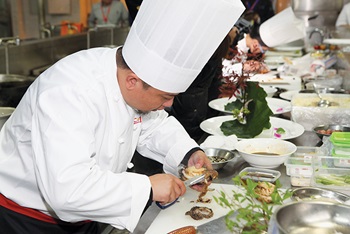The chance to see where Australian wild abalone comes from is drawing the next generation of Chinese chefs to our shores
By Catherine Norwood
Twenty-five of China’s best young seafood chefs will visit Australia’s leading abalone and seafood-producing regions in March to experience firsthand where the products come from and how they are harvested, processed and packed.
The chefs were all finalists in the inaugural Australian Wild Abalone® Innovative Cuisine Design Competition, which was held in Beijing in November 2015. The competition, on 10 November, coincided with the passing of legislation in Australia (on 9 November) to enact the China–Australia Free Trade Agreement. This removes tariffs on a variety of Australian seafood imports into China, including abalone.
For Australian seafood producers, the agreement provides the prospect of increasing returns from the export market, which for abalone and rock lobster alone is worth $760 million a year. These industries contribute $1.3 billion to Australia’s export earnings. Additionally, these sectors support Australian fishing, which provides more than 8500 jobs in rural and regional Australia.
Australia produces about half of the global wild harvest of abalone, with almost 4000 tonnes harvested in 2013-14 worth $138 million, according to the latest national fishing statistics.
 Outstanding Gold Award-winning dish – Yuexiang Fragrance Abalone by chef Zhu Jie from Taizhou City.
Outstanding Gold Award-winning dish – Yuexiang Fragrance Abalone by chef Zhu Jie from Taizhou City.  Bronze Award winning chef Li Hao preparing his dish during the Australian Wild Abalone® Innovative Cuisine Design Competition.
Bronze Award winning chef Li Hao preparing his dish during the Australian Wild Abalone® Innovative Cuisine Design Competition.Photos: Australian Wild Abalone Program
The Australian Wild Abalone® culinary competition has been developed in partnership with the China Cuisine Association to showcase the combination of premium Australian produce and Chinese culinary skills. It follows six years of research into the Chinese market with the assistance of the Australian Seafood Cooperative Research Centre and the FRDC.
The aim of the competition is to inspire Chinese cuisine and catering industries to use Australian Wild Abalone® in unique and innovative ways. It is also an opportunity to improve the abalone product knowledge of young Chinese chefs.
To enter the competition chefs were required to submit photos and descriptions of their dishes online. There were 115 entries received from 81 chefs throughout China during September and October.
These entries were put through a rigorous judging process by a distinguished panel of culinary judges. Ten finalists were selected and they competed with each other in a cook-off at the Jinsong Vocational School in Beijing. The finalists produced their best Australian Wild Abalone® dish in an exciting live competition showdown.
The winning chef, Zhu Jie, created Australian Wild Abalone® in plum juice and black rice. He has been named as Australian Wild Abalone®’s official Chinese chef ambassador.
The Australian Gourmet Adventure will take place in March and it is part of the competition prize for Zhu Jie, nine other finalists and a group of 15 interested chefs. As well as visiting abalone production areas, they will meet with Australian chefs and visit several Australian tourist attractions. This prize has been supported by the Tasmanian Department of State Growth and the Australian Hotels Association.
Dean Lisson, chief executive of the Tasmanian Abalone Council and executive chair of the Abalone Council Australia, says the competition has also sparked a request from Chinese restaurateurs to visit Australia as part of a formal delegation with the China Cuisine Association.
“This is great news for the Australian wild abalone sector but also for other Australian primary producers,” Dean Lisson says. “China has a long history and tradition in the culinary arts. Australia has a similar history and tradition in producing fine-quality, safe, sustainable, nutritious and, even more important, tasty wild-caught abalone.
“The competition allowed both countries to showcase their skills and knowledge and to start forming a strong partnership that will provide a fantastic platform to further promote the special features of Australian Wild Abalone® and our relationship with China.”
Dean Lisson says the finalisation of the China–Australian Free Trade Agreement will help maintain this momentum and secure the future of Australian fishing as exporters of premium seafood.
“Right now we are feeling really positive about the future."
FRDC Research Code: 2009-723.20





